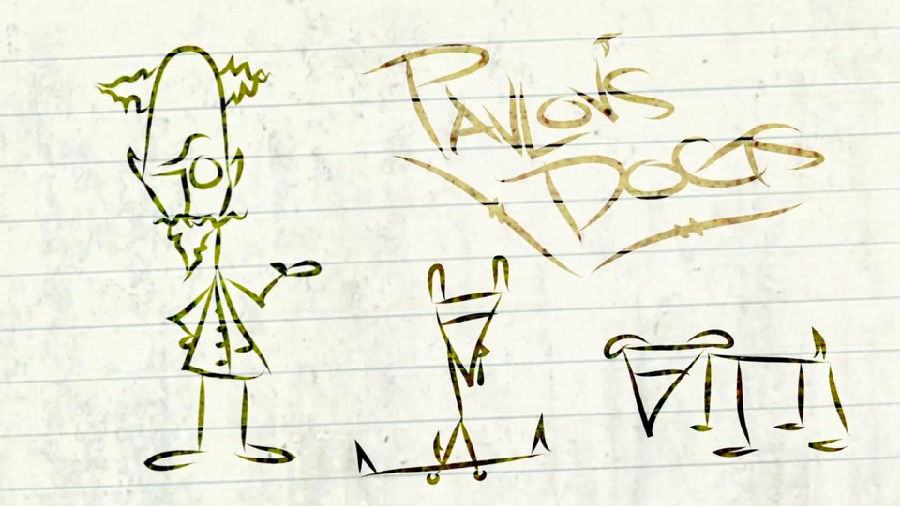(单词翻译:单击)
You've probably heard of Pavlov's dogs, the phrase that often summarizes Dr. Ivan Pavlov's early 20th century research,
你可能有听说过“巴甫洛夫的狗”,它通常指的是伊凡·巴甫洛夫博士二十世纪初期的一项研究,
in which he demonstrated that we can alter what stimuli elicit a reflective response in canines.
这项研究论证了我们可以通过改变刺激因素,使狗产生反射性反应。
He showed this by sounding a bell just before he presented his group of dogs with meat powder.
在摇铃后,巴甫洛夫博士在一群狗的面前放了肉粉。
After many presentations of the bell, followed by tasty meat powder,
在多次重复摇铃、然后放肉粉这个过程之后,
the dogs eventually began to salivate at just the sound of the bell.
最终,这些狗在仅听到铃声时就开始流口水了。
They salivated even when there was no meat powder present.
即使铃响后没有肉粉,狗群也会流口水。
This phenomenon isn't limited to dogs. Consider the placebo effect,
这个现象并不局限于狗。想想“安慰剂效应”,
in which a pill with no active substances brings about a response similar to a pill with a substance present.
就是服用无效用的药也会使人产生像服用了有效用的药才会产生的反应。
What changes here is our reaction to our ailment, such as perceiving less pain and not the ailment itself.
其实我们改变的只是我们对疾病的反应,比如感觉没那么疼了,而疾病本身并没有改变。
Or, consider the love humans have for a parent.
再比如,我们对父母的爱。
Some would argue that this love is instinctual, and they may be partially right.
有些人会觉得这种爱是本能的,这可能也部分正确。
But, the argument fails to account for the equal amount of love that children adopted later in life hold for their adoptive parents.
然而,这一论点没办法解释当小孩被养父母收养时,他们在往后的生活中对养父母也产生同样那么多的爱。
But the behaviorist argument can account for both accounts of love.
但是行为学家的论点可解释这两种爱。
A parent, biological or not, is constantly paired with things like food, smiles, toys, affection, games, protection, and entertainment.
父母亲,不管有没有血缘关系,会持续性地和许多东西关联在一起,像是食物、微笑、玩具、情感、游戏、保护以及娱乐。
And a parent's constant association with these wonderful or crucial aspects of a child's life
而父母亲长期与这些小孩生命中如此美好或重要的事物相结合,
has a similar, albeit more complicated, effect that meat powder had on Pavlov's salivating dogs.
尽管更复杂,但这就像是肉粉对巴夫洛夫流口水的狗的影响一样。

In other words, if one's parent is predictive of really good or really important things,
换句话说,如果父母亲预示着很棒或很重要的事物,
then one's parent becomes a really good and important thing, too.
那么父母亲也就成为了很棒及很重要的事物。
And there is also romantic advice to be gained from Pavlov's observations.
而从巴夫洛夫的观察中也可以得到一些浪漫的启示。
We all need food to survive, right?
我们都需要食物,对吧?
And someone who can provide such things in a delicious, saliva-producing manner stands to become our human equivalent of a ringing bell.
而如果某人可以提供美味的、令人垂涎的食物,那这个人就扮演了相当于铃声的角色。
In other words, if you can cook one or more scrumptious meals for a potential love interest,
也就是说,如果你为你爱慕的人准备了美味的一餐,
there's a good chance that you'll be viewed more favorably in the future, even if you didn't prepare the delicious food.
那么在未来,你很有机会在对方眼中好感度更高,即使下次你没有准备美味的食物也没关系。
And who wouldn't want the love of their life drooling over them?
而谁不想得到一生挚爱的追求呢?
But life is not just bell rings and salivation.
但人生并不只是铃声和口水。
There's also a dark side to this type of learning, called "taste aversion".
这类制约学习的过程中也有负面的效果,叫做“味觉厌恶”。
Taste aversion occurs when we ingest some food that eventually makes us sick,
当我们吃了让我们生病的食物时,味觉厌恶就会产生,
and, as a result, we avoid that food, sometimes for the rest of our lives.
结果就是,我们会避免吃这种食物,有时候一辈子都不会再吃。
Taste aversion is so powerful that the effect can be seen
味觉厌恶极具影响力,
even if the illness is experienced hours later and even if the food itself did not actually make us sick.
即使是在几小时后才发病,或是那项食物实际上并不是生病的主因,我们还是可以看到同样的效果。
Such is the case when we have the flu, and, by accident, we ingest some food moments prior to vomiting.
好比说我们得了感冒,而恰巧我们吃了某样食物,之后吐了。
In this case, we know that the food did not cause the vomiting, but our bodies don't know that.
在这情况下,我们知道这种食物并没有造成呕吐,但我们的身体并不知道。
And the next time we encounter that food, we are likely to refuse eating it.
而下次我们再遇到同样的食物,我们很可能就会拒绝吃它。
Now, imagine the potential consequences of undercooking a meal on a first date.
现在,想象一下在第一次约会中饭没煮熟的潜在后果。
If the food makes your date sick, it is possible for them to associate that bad feeling with not just the food, but with your food in particular.
如果食物让你的伴侣不舒服,对方很有可能不单单把这个不好的感觉与食物联系到一起,而是着重与“你”的食物联系到一起。
If the episode was traumatizing enough, or if it also happens on a subsequent date,
如果这段情节已经够糟了,或是之后的约会也发生类似的事情,
they may come to relate you with the consequences, just like Pavlov's dogs related the bell with the meat powder.
那么对方也许会把你和结果联系到一起,就像巴夫洛夫的狗一样,把铃声和肉粉作连结。
In other words, the sight of you showing up at the next dinner date might actually make your date nauseous!
换句话说,在下次的晚餐约会时,你的出现很可能就是实际上令人作呕的原因!
As the old saying goes, the fastest way to someone's heart is through their stomach, assuming you don't make them sick in the process.
正如老话讲的:要抓住一个人的心,要先抓住他的胃。当然前提是在这个过程中,你没有令对方身体不适。


